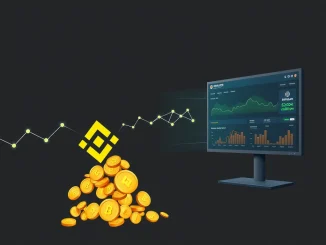
Exciting news for the decentralized finance (DeFi) space! HyperLiquid, a prominent decentralized exchange (DEX), has just unveiled a groundbreaking upgrade that puts the power of asset delisting directly into the hands of its validators. This move towards enhanced decentralization and on-chain governance is sending ripples through the crypto community. Let’s dive into what this upgrade entails and why it matters.
Unveiling HyperLiquid’s On-Chain Voting for Asset Delisting
HyperLiquid has announced a significant leap forward in its governance model. Through a recent blockchain upgrade, the DEX now enables full on-chain validator voting for the critical process of asset delisting. This isn’t just a minor tweak; it’s a fundamental shift towards a more decentralized and transparent operation. Imagine a system where decisions about which assets are supported are not solely made by a central authority, but rather by the network’s validators themselves, directly on the blockchain. That’s precisely what HyperLiquid is bringing to the table.
How Does On-Chain Validator Voting Work?
The process is designed to be straightforward and efficient. Here’s a breakdown:
- Proposal for Delisting: A proposal to delist an asset can be initiated within the HyperLiquid network.
- Validator Voting: Validators, who are key participants in maintaining the blockchain’s integrity, are then given the opportunity to vote on this proposal.
- Quorum Requirement: For a delisting to be enacted, a predefined quorum of staked validators must participate and vote in favor.
- Automatic On-Chain Suspension: If the quorum is reached and the vote is successful, the system automatically suspends support for the asset directly on the blockchain. This means no manual intervention is required, ensuring a trustless and transparent process.
This automated, on-chain approach minimizes the risk of arbitrary decisions and enhances the security and predictability of the asset delisting process. It’s a significant step towards true decentralization in DEX operations.
Why On-Chain Governance for Asset Delisting Matters
The move by HyperLiquid to implement on-chain voting for asset delisting carries several important benefits for the platform and its users:
- Increased Decentralization: Shifting decision-making power to validators, who are distributed participants in the network, reduces reliance on a central entity. This aligns with the core ethos of blockchain and cryptocurrency.
- Enhanced Transparency: All voting processes and outcomes are recorded on the blockchain, making them publicly auditable and verifiable. Users can track the voting process and understand the rationale behind asset delisting decisions.
- Improved Security: Automating the process on-chain minimizes the potential for manipulation or human error. The system operates based on pre-defined rules and consensus mechanisms.
- Community Empowerment: While validators are the direct voters, this system ultimately empowers the broader community by ensuring that key decisions are made through a transparent and decentralized process.
In essence, on-chain governance for asset delisting builds greater trust and confidence in the HyperLiquid DEX ecosystem.
HyperLiquid’s Demo Vote: MYRO Perpetual Contracts in the Spotlight
To showcase the functionality of this new upgrade, HyperLiquid is conducting a primitive demo vote focused on delisting MYRO perpetual contracts. This real-world test is crucial for demonstrating the practical application of on-chain validator voting.
Here are the key details of the demo vote:
- Asset for Vote: MYRO perpetual contracts
- Voting Date & Time: March 29th at 13:00 (UTC)
- Participating Validators: Validators 2 through 5
- Validator 1 (Hyper Foundation): Will abstain from this initial vote to allow for the completion of delegations to participants in the Delegation Program.
This demo vote serves as a practical example of how the on-chain voting mechanism will operate in real-time. It provides a valuable opportunity for the HyperLiquid community and observers to witness the new governance system in action.
What Does This Mean for the Future of DEX Governance?
HyperLiquid’s implementation of on-chain validator voting for asset delisting sets a powerful precedent for other DEX platforms. It highlights the growing trend towards decentralized governance in the crypto space. As DeFi continues to mature, we can expect to see more projects adopting similar mechanisms to enhance transparency, security, and community involvement in critical decision-making processes.
Potential Implications and Considerations
While the benefits are clear, it’s also important to consider potential implications and challenges:
| Aspect | Consideration |
|---|---|
| Validator Responsibility | Validators now bear a greater responsibility in platform governance. They need to be well-informed and act in the best interests of the ecosystem. |
| Voter Participation Rates | Ensuring consistently high validator participation in voting is crucial for the system’s effectiveness. Incentives and clear communication will be important. |
| Complexity of Proposals | As governance evolves, proposals might become more complex. Clear and accessible information will be needed to facilitate informed voting. |
| Evolution of Governance Models | This is likely just the beginning. We can anticipate further innovations in DEX governance models as the space matures and learns from implementations like HyperLiquid’s. |
Conclusion: A Revolutionary Step Towards Decentralized DEX Operations
HyperLiquid’s blockchain upgrade to enable on-chain validator voting for asset delisting is a revolutionary move in the world of decentralized exchanges. It represents a significant stride towards truly decentralized governance, enhancing transparency, security, and community empowerment. The upcoming demo vote on MYRO perpetual contracts will be a key event to watch, showcasing the practical application of this innovative system. As DeFi continues to evolve, expect to see more projects drawing inspiration from HyperLiquid’s bold step towards on-chain governance. This is not just an upgrade; it’s a powerful signal of the future direction of decentralized finance.



